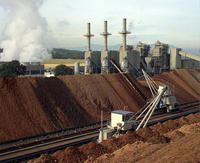-
Android app for radioactivity detection

Just-release Android app uses software and the smartphone’s camera to measure radioactivity levels, allowing users to find out whether their environments are safe; the software is the civilian version of technology developed under contracts with the U.S. Department of Defense and with DHS
-
-
Seattle police takes steps to quell drone concerns
The Seattle Police Department recently acquired a small camera-equipped drone, but it remains unused while city policymakers work to calm privacy concerns
-
-
Kansas City to deploy ShotSpotter technology
Kansas City police and the Kansas City Area Transportation Authority have agreed jointly to deploy the Shot Spotter, an acoustic technology that provides detailed information on gunshots fired
-
-
British state-backed reinsurer has £4.5 billion to cover Olympic Games terror-related losses
Pool Re, the British state-backed reinsurer which covers commercial property losses from terror attack-related activities, has £4.5 billion ($7.327 billion) of assets to cover the Summer Olympic Games. Pool Re said it had no plans to jack up premiums for the event. If the damage from bombings or other terror-related incidents were to cost more than that amount, the British taxpayer, under the Pool Re structure, would step in to cover the difference. Pool Re was set up in the 1990s when the U.K. government was worried that the terror campaign pursued by Irish militant groups could make London property uninsurable and damage the national economy.
-
-
Oklahoma University gets DHS research grant
The University of Oklahoma Health Sciences Center (OUHSC) was awarded a $490,000 grant from DHS for a 2-year study of how law enforcement officers utilize awareness of their surroundings to collect and then analyze intelligence related to potential terrorist threats
-
-
Facebook, antivirus providers in Internet security campaign
Facebook, Microsoft, McAfee, Symantec, Trend Micro, and Sophos have joined in a campaign to make it easier for Facebook users to stay safer and more secure online
-
-
Waste-to-energy technology deployed in California

A new Anaerobic biodigester waste processor, which relies on bacteria to break down biodegradable waste material in the absence of oxygen, is deployed by a Sacramento, California company; it converts 7.5 tons per day of food waste from regional food producers, including Campbell’s Soup Company, and a half ton each day of unrecyclable corrugated material into natural gas; the system will generate roughly 1,300 kWh of renewable energy per day, meeting about 37 percent of the company’s electricity needs and preventing an estimated 2,900 tons of waste from entering landfills each year
-
-
Harris deploys public safety communications system in Virginia
Harris Corporation has received a $10 million contract from Pittsylvania County, Virginia, to deploy a public safety digital communications system based on P25 Phase 2 standards
-
-
Wisconsin county has a new LMR system
In Rock County, Wisconsin, firefighters have been required manually to change radio channels as they moved from North to South because of two different frequencies in the region; Raytheon is helping to combine three disparate communications systems in the country into one; the result will be more efficient – and interoperable – first response communication system
-
-
Scientists: Deepwater Horizon exposed gaps in deepwater oil spill knowledge

On the second anniversary of the Deepwater Horizon oil spill in the Gulf of Mexico, a national team of scientists warns that inadequate knowledge about the effects of deepwater oil well blowouts threatens scientists’ ability to help manage comparable future events
-
-
Honda to reuse rare Earth metals from used parts

Rare Earth elements are essential to advanced technological application and to green technology products; China controls 97 percent of the world’s production of these elements, and has been using its near-monopoly to hobble non-Chinese companies and for political blackmail; in response, two Japanese companies announce a new process allowing them to extract as much as 80 percent or more of rare Earth metals contained in used nickel-metal hydride batteries
-
-
INCOM to commercialize Argonne’s detection technology
Microchannel plate (MCP) detectors are used for detection of particles (electrons or ions) and impinging radiation (ultraviolet radiation and X-rays); this is an important technology for a variety of imaging applications ranging from medicine and physics to national security
-
-
Westinghouse AP1000 reactor concludes qualification testing
Westinghouse AP1000 nuclear reactor’s design differs from earlier reactor design in that it employs passive safety systems which rely only on natural forces such as gravity safely to shutdown and remain cool; Westinghouse says it has successfully completed the design, manufacture, and qualification of the lead AP1000 Reactor Coolant Pump
-
-
£5 million investment in U.K. rail technology, business innovation
The U.K. government is leading on an investment of £5 million to accelerate business innovation and growth in the U.K. rail industry, using the funds to support the development of technologies to address technological and business challenges
-
-
Simulations helps overcome design challenges
Simulation software can pull volumes of complex data beyond simple measurements (think comparative load or stress tolerances) and layer that information into images; simulation can show how a bridge will perform based on how it is used, the conditions around it, its design, materials, and even variables such as the position of a joint — before a single component is manufactured or ground is broken
-
- All
- Regional
- Water
- Biometrics
- Borders/Immig
- Business
- Cybersecurity
- Detection
- Disasters
- Government
- Infrastructure
- International
- Public health
- Public Safety
- Communication interoperabillity
- Emergency services
- Emergency medical services
- Fire
- First response
- IEDs
- Law Enforcement
- Law Enforcement Technology
- Military technology
- Nonlethal weapons
- Nuclear weapons
- Personal protection equipment
- Police
- Notification /alert systems
- Situational awareness
- Weapons systems
- Sci-Tech
- Sector Reports
- Surveillance
- Transportation
Advertising & Marketing: advertise@newswirepubs.com
Editorial: editor@newswirepubs.com
General: info@newswirepubs.com
2010-2011 © News Wire Publications, LLC News Wire Publications, LLC
220 Old Country Road | Suite 200 | Mineola | New York | 11501
Permissions and Policies
Editorial: editor@newswirepubs.com
General: info@newswirepubs.com
2010-2011 © News Wire Publications, LLC News Wire Publications, LLC
220 Old Country Road | Suite 200 | Mineola | New York | 11501
Permissions and Policies
